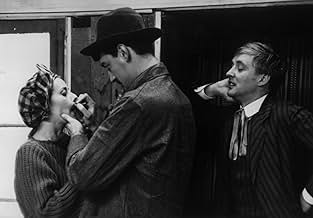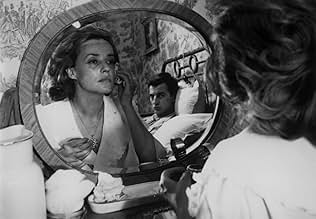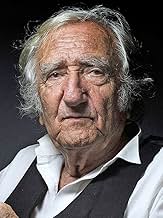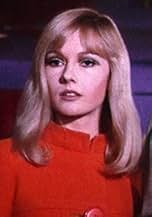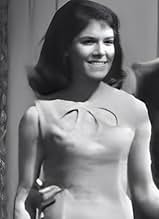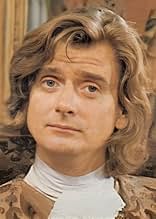IMDb-BEWERTUNG
7,7/10
46.149
IHRE BEWERTUNG
Jahrzehnte einer Dreiecks-Liebesgeschichte über zwei Freunde und eine impulsive Frau.Jahrzehnte einer Dreiecks-Liebesgeschichte über zwei Freunde und eine impulsive Frau.Jahrzehnte einer Dreiecks-Liebesgeschichte über zwei Freunde und eine impulsive Frau.
- Regie
- Drehbuch
- Hauptbesetzung
- Nominiert für 2 BAFTA Awards
- 3 Gewinne & 4 Nominierungen insgesamt
Oskar Werner
- Jules
- (as Oscar Werner)
Serge Rezvani
- Albert
- (as Bassiak)
Michel Subor
- Récitant
- (Synchronisation)
- …
Danielle Bassiak
- Compagnon d'Albert
- (Nicht genannt)
Elen Bober
- Mathilde
- (Nicht genannt)
Pierre Fabre
- Ivrogne in Cafe'
- (Nicht genannt)
Dominique Lacarrière
- Une des femmes
- (Nicht genannt)
Bernard Largemains
- Merlin
- (Nicht genannt)
Kate Noelle
- Birgitta
- (Nicht genannt)
Jean-Louis Richard
- Cliente au Cafe'
- (Nicht genannt)
Michel Varesano
- Cliente au Cafe'
- (Nicht genannt)
Christiane Wagner
- Helga
- (Nicht genannt)
Empfohlene Bewertungen
Jules et Jim is a difficult film, there's no question about that. I'd say the only thing that kept me watching was my love of Truffaut his ingenuity in cinematography, dialogue and just the whole tone of the film. That he could keep such melodramatic (if not drab) stuff somewhat entertaining is a testament to his mastery of the medium. I loved the blending of historical film into the narrative; I don't know if he was the first person to do this I highly doubt it but he certainly did it well in this picture.
Jules et Jim is a study of capriciousness. Catherine a woman to whom monogamy seems like a foreign concept is, to paraphrase the film, `not particularly intelligent, beautiful or kind, but she's treated like a queen.' Why Jules and Jim love her so, I don't know. They seem like strong enough characters to be without such a difficult woman, but I guess that question is at the center of the film.
For some reason, Jules et Jim reminded me of L'Avventura by Antonioni maybe because it was also a hard movie to enter and because the characters were so inaccessible. There are certainly elements of the neo-realism in this film, (one need look no further than the extensive use of mist and the forest scenes that closely resemble the dream sequences of Fellini, De Sica, et. al.)
Overall, I would say this picture is worthwhile, although there are certainly better, more accessible and mature Truffaut films out there.
Jules et Jim is a study of capriciousness. Catherine a woman to whom monogamy seems like a foreign concept is, to paraphrase the film, `not particularly intelligent, beautiful or kind, but she's treated like a queen.' Why Jules and Jim love her so, I don't know. They seem like strong enough characters to be without such a difficult woman, but I guess that question is at the center of the film.
For some reason, Jules et Jim reminded me of L'Avventura by Antonioni maybe because it was also a hard movie to enter and because the characters were so inaccessible. There are certainly elements of the neo-realism in this film, (one need look no further than the extensive use of mist and the forest scenes that closely resemble the dream sequences of Fellini, De Sica, et. al.)
Overall, I would say this picture is worthwhile, although there are certainly better, more accessible and mature Truffaut films out there.
Although "Jules and Jim" was made over 40 years ago and takes place 40 to 50 years before that, the amazing thing is that it barely seems to have dated. Because it focuses on the universal human relationships between its characters, rather than the specific time in which they live, it's the rare film set in the past that doesn't feel like a "period film." And, especially in the first half of the movie, Truffaut's New Wave techniques lend a remarkable energy and freshness.
The movie explores friendship and love among three semi-bohemian types: Parisian Jim (Henri Serre), Austrian Jules (Oskar Werner), and Catherine (Jeanne Moreau), the beautiful, free-spirited woman whom they both love. She's the most vibrant character in the movie, and impossible to pin down. It's never clear who she lovesshe contradicts herself repeatedly, and perhaps loves no one but herselfor whether she's diabolical or simply misunderstood. Moreau nearly steals the movie, if not for the fact that the title reminds us to focus on the relationship between the two men, and that Serre and Werner give good performances too. Even if Jim and Jules aren't as mysterious as Catherine, they're complex and interesting characters in their own right.
The story plays out rather episodically, which means "Jules and Jim" is full of wonderful little moments, often involving the crazy things Catherine does. Some of my favorites include her dressing up as a man and racing Jules and Jim across a bridge; her jumping into the Seine in frustration; and her singing the movie's charming theme song, "The Whirlpool of Life." The episodes are linked together by surprisingly unobtrusive off-screen narration, which keeps the film moving along rather than slowing it down.
"Jules and Jim" does get a little tiresome toward the end, with Catherine continually vacillating between the men in her life, Jim vacillating between Catherine and his old girlfriend Gilberte, and Jules remaining loyally devoted to Catherine despite how foolish this may seem. However, the movie is redeemed by its tragic final scenes, which poignantly contrast with the carefree gaiety of the beginning. Jules, Jim, and Catherine are caught in a destructive spiral, tossed and defeated by the whirlpool of life. Still, the tone of the movie is gentle and human, not pessimistic. Truffaut considered "Jules and Jim" a "hymn to life," and it is most memorable as a vivid celebration of friendship and youthful possibility, even as it acknowledges how those things can sour.
The movie explores friendship and love among three semi-bohemian types: Parisian Jim (Henri Serre), Austrian Jules (Oskar Werner), and Catherine (Jeanne Moreau), the beautiful, free-spirited woman whom they both love. She's the most vibrant character in the movie, and impossible to pin down. It's never clear who she lovesshe contradicts herself repeatedly, and perhaps loves no one but herselfor whether she's diabolical or simply misunderstood. Moreau nearly steals the movie, if not for the fact that the title reminds us to focus on the relationship between the two men, and that Serre and Werner give good performances too. Even if Jim and Jules aren't as mysterious as Catherine, they're complex and interesting characters in their own right.
The story plays out rather episodically, which means "Jules and Jim" is full of wonderful little moments, often involving the crazy things Catherine does. Some of my favorites include her dressing up as a man and racing Jules and Jim across a bridge; her jumping into the Seine in frustration; and her singing the movie's charming theme song, "The Whirlpool of Life." The episodes are linked together by surprisingly unobtrusive off-screen narration, which keeps the film moving along rather than slowing it down.
"Jules and Jim" does get a little tiresome toward the end, with Catherine continually vacillating between the men in her life, Jim vacillating between Catherine and his old girlfriend Gilberte, and Jules remaining loyally devoted to Catherine despite how foolish this may seem. However, the movie is redeemed by its tragic final scenes, which poignantly contrast with the carefree gaiety of the beginning. Jules, Jim, and Catherine are caught in a destructive spiral, tossed and defeated by the whirlpool of life. Still, the tone of the movie is gentle and human, not pessimistic. Truffaut considered "Jules and Jim" a "hymn to life," and it is most memorable as a vivid celebration of friendship and youthful possibility, even as it acknowledges how those things can sour.
Whenever a commentator declares outright that a film is a complete waste of time and that nobody, BUT NOBODY, should ever watch it, I tend to peg that commentator as an opinionated ass. So I would never say that about a well-respected film like "Jules and Jim." But quite honestly, I can't warm up to it. I've watched it on more than one occasion over the years, and it never fails to put me to sleep at both ends of my anatomy. I've just viewed a DVD edition in which a film scholar clearly explains his views on the fascination of "Jules and Jim." But I still couldn't see why the relationship of these three tedious characters, discussed and analyzed in all its very tedious minutiae by those same characters and an off-screen narrator (also tedious), should interest me. It's certainly beloved by academic types (maybe for those very same characteristics?), and film critics eat it up like it has gravy on it. Like another commentator, I'm a bit puzzled by all the comments about its lyrical, lighthearted and idyllic qualities. I'm left with the impression of a rather dry, academic dissertation on the complexities of male-female relationships ca. 1961 (the 1910 setting seems to me immaterial to the script).
I can't help feeling that I'm missing something, and I'm not averse to French films, but they're usually older, pre-new-wave films, for example "Forbidden Games," "French Can-Can," or Pagnol's "Fanny" trilogy. I take it that the sentimentality of such films is one of the things new wave directors reacted against. If so, I can't jump on their bandwagon, try as I might. I've enjoyed some of Truffaut's work, but not this, I'm afraid.
To those who love and appreciate "Jules and Jim" -- have pleasure of it. I envy you for that, and maybe I'll try it again in a few years.
I can't help feeling that I'm missing something, and I'm not averse to French films, but they're usually older, pre-new-wave films, for example "Forbidden Games," "French Can-Can," or Pagnol's "Fanny" trilogy. I take it that the sentimentality of such films is one of the things new wave directors reacted against. If so, I can't jump on their bandwagon, try as I might. I've enjoyed some of Truffaut's work, but not this, I'm afraid.
To those who love and appreciate "Jules and Jim" -- have pleasure of it. I envy you for that, and maybe I'll try it again in a few years.
Tonight I finally watched Jules and Jim again for the first time in many years, and it made me angry. I'm not sure why, but there's something about the romanticization of inconstancy that I find disturbing. Jeanne Moreau is, of course, riveting, mostly, and the film is beautifully made. It's just that I can't shake the feeling that what is being portrayed as a great force of nature the essence of Moreau's character as "une vrai femme" -- is really a powerful but unsteady egotism, enormous grace and charm coupled with an inability to conceive of the reality of other people, or at least to share in mutual reality. In its place there is the lightning of desire in an oversimplified context of defiance against hypocrisy. There is something false about the whole business, as if the movie wants to celebrate the (ostensible) freedom of la belle Catherine and to do so it must attribute the human damage she causes to some grand sort of fate, not ordinary consequence, and the failure and the damage is made to seem mysteriously inevitable. Worse yet, by identifying her as an elemental power and attributing this to her absolute femininity, the film is misogynistic. That is, it implies that the ultimate nature of woman is beyond reason, beyond morality.
And yet Truffaut does it all so beautifully that it seems to undercut the negative part, the pain and waste of what happens to people. Still, smiling cruelty is cruelty. Sorry for ranting. I wanted to like the movie, and I did to a large extent, but it bothered me, too.
And yet Truffaut does it all so beautifully that it seems to undercut the negative part, the pain and waste of what happens to people. Still, smiling cruelty is cruelty. Sorry for ranting. I wanted to like the movie, and I did to a large extent, but it bothered me, too.
Those with heavy sensibilities along the lines of conventional "morality" seem to have a hard time allowing themselves to enjoy this film for what it is: A beautiful visual poem about the passing of time and the progression and growth of an unusual friendship. This friendship may be unusual but feels completely natural and true. Jules and Jim if anything, exhibit great maturity in their relationship with each other and Catherine. It's refreshing to see a film dealing with a deep love, friendship and emotional bond between two males and a mutual love for a woman, without the usual competitiveness and controlling possessiveness that is the norm. Jules and Jim come off more as an enlightened pair. It seems understood among them there is no real belonging of one human being to another. Catherine's whims of the heart are discussed between them at every stage throughout the film and they are willing to accept them and love her for who she is as well as each other.
I do feel that this film lost it's pacing toward the end and seemed to speed up to conclusion. That being it's only flaw. Visually it is stunning. Francois Truffaut was a poet with the camera and his subtle nuances are captivating. The scenes of Jules, Jim and Catherine enjoying days together seem so natural and evoke the feel of wonderful days spent together among best friends that transported me back to days gone by.
"we met with a kiss/ a hit, then a miss/ and we parted/ we went our own ways/ in life's whirlpool of days/ around and around we go/ together bound/ together bound."
I do feel that this film lost it's pacing toward the end and seemed to speed up to conclusion. That being it's only flaw. Visually it is stunning. Francois Truffaut was a poet with the camera and his subtle nuances are captivating. The scenes of Jules, Jim and Catherine enjoying days together seem so natural and evoke the feel of wonderful days spent together among best friends that transported me back to days gone by.
"we met with a kiss/ a hit, then a miss/ and we parted/ we went our own ways/ in life's whirlpool of days/ around and around we go/ together bound/ together bound."
Wusstest du schon
- WissenswertesHenri-Pierre Roché's original novel was based on his own experiences as a young man. The original Catherine was still alive when the film was released and even attended the premiere incognito.
- PatzerWhen Catherine lights the letters on fire, they are at first away from her dress, but in the next shot they are burning on top of her dress.
- Alternative VersionenThe Criterion Region 1 disc and the Tartan Region 2 DVD have a scene in which the film is reversed left/right. When Jules, Jim, and Albert are sitting on the grass sharing stories about the war, the order of the three characters repeatedly changes between shots. This does not occur in other DVD releases of this film, including the Fox/Lorber Region 1 release.
- VerbindungenEdited into Laggiù qualcuno mi ama (2023)
Top-Auswahl
Melde dich zum Bewerten an und greife auf die Watchlist für personalisierte Empfehlungen zu.
- How long is Jules and Jim?Powered by Alexa
Details
- Erscheinungsdatum
- Herkunftsland
- Sprachen
- Auch bekannt als
- Jules and Jim
- Drehorte
- Produktionsfirmen
- Weitere beteiligte Unternehmen bei IMDbPro anzeigen
Box Office
- Bruttoertrag in den USA und Kanada
- 509 $
- Eröffnungswochenende in den USA und in Kanada
- 11.206 $
- 25. Apr. 1999
- Weltweiter Bruttoertrag
- 497.686 $
- Laufzeit
- 1 Std. 45 Min.(105 min)
- Farbe
- Sound-Mix
- Seitenverhältnis
- 2.35 : 1
Zu dieser Seite beitragen
Bearbeitung vorschlagen oder fehlenden Inhalt hinzufügen

![Bande-annonce [OV] ansehen](https://m.media-amazon.com/images/M/MV5BMWM5OGI0MjUtZDRhMC00ZGQ1LTk0NWEtMWMzZDFhMjA1OTk1XkEyXkFqcGdeQXRodW1ibmFpbC1pbml0aWFsaXplcg@@._V1_QL75_UX500_CR0)
